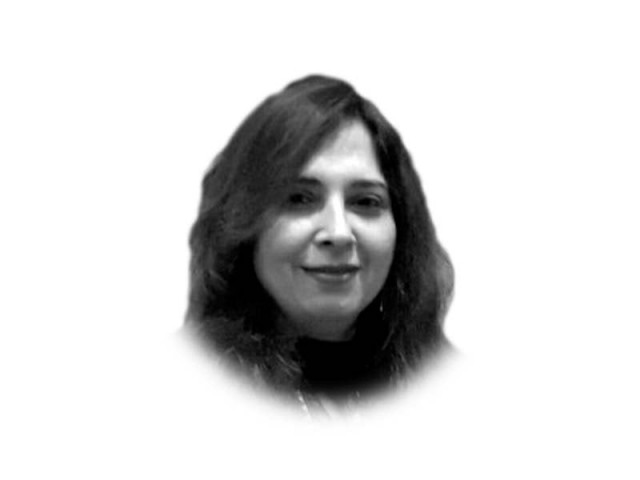Extremism persists
IJT assumes the role of society modifier using violence to get their agenda of morality established

A visit to Punjab University has rarely been a joy. The event manager of the function that I attended at the university told me that he had been strictly forbidden to play music other than just one or two verses of any national song. It was not necessary to ask what made the administration arrive at this unhealthy decision. At the university, every boy and girl are suspected of having illicit relations. Since it is almost possible for every girl and boy to form promiscuous relations, the self-appointed moral police of the Islami Jamiat-e-Talaba (IJT) see that anything they deem as a sexual stimulant is kept out of the campus. Music is one of them. The IJT has assumed the role of society modifier with the jurisdiction to use violence to get their agenda of morality established in academic institutions. Last week, it had a scuffle with a group of students of the Government Science College, Wahdat Road, Lahore, on their alleged involvement in using drugs. During the chaos, a student fell from the roof of the college, sustaining severe injuries.
It is not only IJT that resorts to intimidation and violence in dealing with their opponents. Even lawyers, doctors, teachers, and students take the law into their hands. The lawmakers in parliament get violent when responding to the opposition. We have learned to defend our lives, this country, our moralities, and our individual interpretations of Islam through brick and mortars.
Violence was not the language we used in the first three decades after the creation of Pakistan. People were way calmer and mature to handle things through discussion. Respect for others’ opinions prevailed. Moral values were sublimely followed; nobody had to force them down others’ throats. However, with the coming apart of East Pakistan, a new sense of [in]security grew, making it imperative for us to become more vital to keep the remaining Pakistan from falling into the hands of the enemies. Instead of looking inward to find the cause of the breakup, the urge to pass the buck on the enemies looked more relevant. The fear of getting scooped, lest we lower our guards, was required to shift the strategy from being militarily lean to building a large arsenal. It had also become clear that nationalism lacked the vigour to motivate a Pakistani to fend for the country. The ignition to fight for Pakistan had to come from somewhere else. So, we borrowed the spark from religion and made Pakistan Islam’s fortress. Bhutto went so far as to declare Pakistan a socialist Islamic country.
Though Pakistan has decided to replace the security paradigm with geo-economics, the buyers of this commitment abroad are few and far between. That explains why the FATF’s albatross is refusing to leave Pakistan.
Since 2018, all the FATF plenaries have retained Pakistan in the grey list. On the latest plenaries on June 25, 2021, Pakistan showed progress on 26 out of 27 action points. Hopes were raised that the margin of one point would not stand between FATF’s decision to remove Pakistan from the grey list. However, it was not to be. Marcus Player, the FATF president, said at a virtual press conference, “One action plan still needs to be completed. It concerns investigation and prosecution of senior leaders and commanders of UN-designated terror groups.” He also said that the risk of money laundering remains high, which can fuel corruption and organised crime. In addition, Pakistan will also have to deliver on the six-point action plan delineated by the FATF’s regional outlet, the Asia Pacific Group.
The action plan demands of Pakistan to investigate, prosecute and punish the terrorists designated as global threats.
Pakistan has made strides in this regard, but there is the problem of distrust. Whenever Pakistanis ransack their cities or institutions to establish their version of the blasphemy law or principles of morality, the international community becomes alert. Remember, our G+ status with the European Union was on the verge of collapse when the Tehreek-e-Labaik Pakistan stalwarts sieged Lahore for three days and killed three police officers.
The question is: despite getting almost 99% marks and having tightened the noose around terror financing, what is it that Pakistan is not doing?
It seems the case of three glitches. One is about the technical flaw in the financial sector that still allows money laundering. Second concerns the structural flaws of the legal system. The third has the normative angle to it, which stems from the rising extremism in our country. Although Pakistan may have won the war against terrorism, it has yet to overcome extremism, which is more poisonous.
The route to return to our calmer self is the same we took to arrive at this state of affairs. First, we would have to reform our education system and make it inclusive and more democratic. The first step would be to remove violent forces like the IJT from academic institutions and letting higher education take its direction instead of anchoring it with some ideology.
Published in The Express Tribune, July 1st, 2021.
Like Opinion & Editorial on Facebook, follow @ETOpEd on Twitter to receive all updates on all our daily pieces.














COMMENTS
Comments are moderated and generally will be posted if they are on-topic and not abusive.
For more information, please see our Comments FAQ